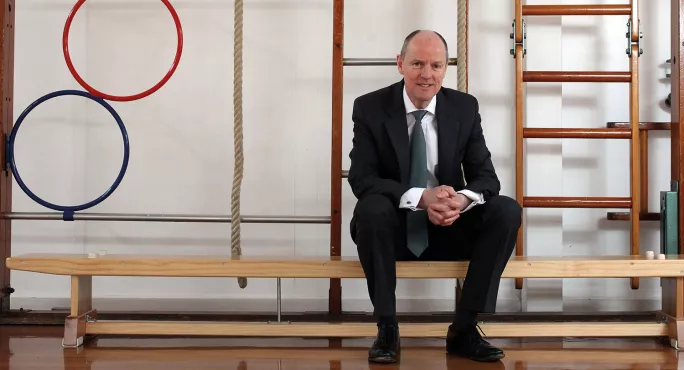Gibb: Ofsted should mark down schools with low EBacc take-up

Former schools minister Nick Gibb has said Ofsted should not judge a school’s quality of education to be “good” if its take-up of EBacc subjects is below the national average.
He also called on ministers to persist with the target of getting 75 per cent of pupils to study the subjects needed for the EBacc, amid warnings that performance against the target set for this year is likely to fall well short.
In a rare interview on education policy since leaving the Department for Education (DfE) last year, Mr Gibb told Tes the target - which was set for 2022 - should be extended as it remains important for social mobility.
And he dismissed calls to reform the EBacc as “the soft bigotry of low expectations”.
- Analysis: Does the EBacc have a future
- Prediction: EBacc is ‘done for’, exams expert claims
- Background: Why the government’s EBacc targets will be missed
His comments come amid mounting speculation about the future of the performance measure as pupil take-up this year is expected to be well below the 75 per cent the government had aimed for by 2022.
Mr Gibb suggested that EBacc take-up could be boosted through Ofsted inspections. He said schools “shouldn’t be graded ‘good’ on quality of education” by Ofsted, “if your EBacc is below national average”.
Currently, Ofsted’s education inspection framework says its teams will not make a judgement about a school’s quality of education based solely or primarily on its progress towards the government’s EBacc ambitions.
Nevertheless, the watchdog said EBacc take-up “is an important factor in understanding a school’s level of ambition for its pupils”.
“It is, therefore, important that inspectors understand what schools are doing to prepare for this and they should take those preparations into consideration when evaluating the intent of the school’s curriculum.”
The EBacc was created just over a decade ago with the aim of increasing the number of pupils who study several traditional academic subjects at GCSE.
To achieve the EBacc, a pupil needs to complete English, maths, two sciences, history or geography and a modern foreign language.
The government set the target of 75 per cent of pupils studying the subjects needed by 2022 and for 90 per cent to do so by 2025.
However, in 2021, just 38.7 per cent of students entered the subjects needed for the EBacc.
There are fresh calls for it to be reformed and a declining number of students taking some modern foreign language GCSEs this year has led to suggestions that it will be quietly ditched.
However Mr Gibb, who was schools minister when the measure was introduced and has been a longstanding champion of the policy, said that EBacc and the government targets should remain in place.
His comments came in response to criticism of the performance measure from the Commons Education Committee chair, Robert Halfon, and Tom Richmond, a former DfE adviser, and founder and director of the EDSK think-tank.
Mr Gibb said: “It’s very important for social mobility and social justice to study the subjects most advantaged pupils take for granted.
“EBacc is made up of two English, maths, two sciences, geography, history and modern foreign languages.
“Of those subjects, English, maths and science are all compulsory until 16. Therefore those who suggest we should make changes to the EBacc surely don’t mean removing those subjects - really what they’re talking about is removing history, geography and MFL.”
He added: “I feel very strongly that in a trading nation like Britain, we should be teaching all children a foreign language. In Europe, we are at the bottom of the league table for foreign languages.”
On the question of the EBacc target, he added: “We just have to try harder. I thought we should set a later date for the target, especially because of the challenges for Covid, but I think we should still be striving to get 75 per cent.”
He also said that there is scope and room, even if you take the EBacc, to study an art or technology.
Mr Halfon said: “The EBacc needs to be reformed to create a parity of esteem for vocational and skills-based subjects alongside a rigorous academic offer.”
Mr Richmond has also questioned the EBacc and the subjects that the government chose for it.
He said: “The DfE’s main justification for the EBacc was that it would assist with entry to the most selective universities because the EBacc subjects closely matched the list of ‘facilitating subjects’ published by the Russell Group of universities.
However, Mr Richmond noted that the Russell Group withdrew its facilitating subject list several years ago “because it had led to ‘misinterpretation’, yet the EBacc has continued as if nothing happened”.
You need a Tes subscription to read this article
Subscribe now to read this article and get other subscriber-only content:
- Unlimited access to all Tes magazine content
- Exclusive subscriber-only stories
- Award-winning email newsletters
Already a subscriber? Log in
You need a subscription to read this article
Subscribe now to read this article and get other subscriber-only content, including:
- Unlimited access to all Tes magazine content
- Exclusive subscriber-only stories
- Award-winning email newsletters



